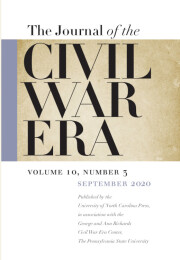September 2020 (vol. 10, no. 3)
Volume 10, Number 3


September 2020
Editor’s Note
Kate Masur and Gregory P. Downs
ARTICLES
Bennett Parten
“Blow Ye Trumpet, Blow”: The Idea of Jubilee in Slavery and Freedom
Building on the recent turn in abolition scholarship emphasizing the shared beliefs that inspired the movement, this essay argues that the idea of Jubilee united abolitionists behind “a shared method of conceptualizing profound social and political change.” The concept of moral progress at the heart of Jubilee was easily integrated into the political arena to raise political support for abolition. American abolitionists consistently imbued Jubilee with millennial promise, concluding that America must destroy the sin of slavery to enable the Second Coming of Christ and his thousand year reign on earth. African American abolitionists led the way in crafting Jubilee celebrations of West Indian emancipation that demanded the political abolition of slavery in the US.
Keywords: Jubilee, Abolition, Anti-Slavery politics, Millennialism, Moral Progress, Political Language, Religion, Old Testament
Angela Zombek
The Power of the Press: Defining Disloyalty at Old Capitol Prison
Wartime newspapers played a critical role in highlighting opposition on the Northern home front by publicizing the position of anti-War Democrats, headlining the Copperhead press’s opposition to the Lincoln administration, and exposing the disloyal acts of everyday civilians. Scholars have focused on the disloyal behavior of people who identified with the former two entities, but have paid virtually no attention to how the popular press helped Americans understand loyal and disloyal behavior on an individual level during wartime. The press performed a “watchdog” function as journalists paid particular attention to men who took advantage of military mobilization to defraud the U.S. government. Ultimately, newspaper coverage of Old Capitol Prison, and of the transgressions that its prisoners committed, reveals that the popular press shaped notions of treason and disloyalty, and molded how Americans interpreted civil liberties during wartime.
Keywords: Old Capitol Prison, Carroll Prison, treason, habeas corpus, civil liberties, popular press, Washington, D.C.
Catherine A. Jones
The Trials of Mary Booth and the Post-Civil War Incarceration of African American Children
On October 17, 1882, Mary Booth, a fourteen-year-old African American girl, arrived at the Virginia State Penitentiary to serve a life sentence after being wrongfully convicted of murder. Working from a fragmented and fragmentary archival record this article reconstructs the tortuous path Booth traveled through Virginia’s courts and prisons. Booth’s story sheds light on how African American children were transformed into new carceral subjects in the wake of emancipation. It also provides insight into the varied strategies black Virginians employed in their efforts to extract meaningful, if inadequate, gains in access to justice under the Readjuster Party. Ultimately, locating Booth’s story within the larger history of children’s incarceration helps explain why Virginia’s late nineteenth century juvenile justice reforms entrenched, rather than diminished, racial disparities for young citizens accused of crimes.
Keywords: incarceration, childhood and youth, juvenile justice, domestic labor, girlhood, Readjusters, Virginia
REVIEW ESSAY
Chandra Manning
Faith and Works: A Historiographical Review of Religion in the Civil War Era
Recently, Civil War religious history has flourished but also bifurcated between scholarship focused on religion’s instrumental effects and scholarship focused on religion’s theological content. In the 1980s, the concept of civil religion inspired important studies of religion’s causal role in the outbreak, progress, and consequences of the war. By the Sesquicentennial, historiography’s anti-war turn called civil religion into ill repute. Meanwhile, some scholars began to attend to theological ideas, especially Providentialism. Currently, tensions persist between scholarship that focuses on what religion did and scholarship centered on what religion was in the interior lives of believers. Each approach carries risks—the former of reducing religion to a utilitarian role its adherents would not recognize, the latter of stripping belief of its context and obscuring its impact on events—but navigating the tensions between these risks may offer insight into how religion helped Civil War Americans made meaning of the conflict.
Keywords: Anti-war turn, Civil Religion, Faith, Historiography, Providentialism, Religion, Theology
BOOK REVIEWS
BOOKS RECEIVED
NOTES ON CONTRIBUTORS

